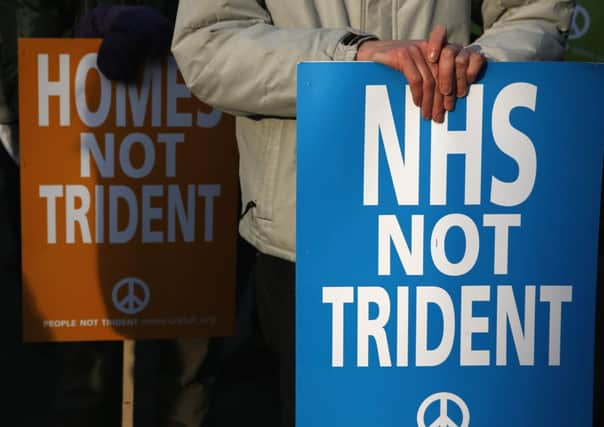Michael Stewart: Time for Trident to go


TICK tock. No, it’s not the sound of Labour’s time running out in Scotland. It’s the Doomsday Clock and it’s just moved closer to midnight. It was created in 1947 to reflect in the eyes of its founding scientists the scale of threats to mankind. The closer to midnight, the higher the cumulative threat.
The clock’s time has moved back and forth over the years, ranging from two minutes to midnight in 1953 (as nuclear capability expanded and the Cold War began) to 17 minutes to midnight in 1991 (after the fall of the Berlin Wall).
Advertisement
Hide AdAdvertisement
Hide AdOn Thursday, the clock’s guardians announced it had moved from five minutes to three minutes to midnight due to the growing threat of climate change and nuclear war.
The clock has shown five minutes to midnight since 2012. It was last at three minutes to midnight during the Cold War.
It is not an assessment of threats to any specific country but rather to civilisation. In this respect, the case for nuclear disarmament has never been stronger.
The SNP, Greens and Welsh nationalists Plaid Cymru last week forced a debate in the House of Commons on the abolition of Trident on the Clyde. All three London parties, including Miliband-Murphy’s Labour, supported the retention of nuclear weapons on Scottish soil.
If Jim Murphy is so keen to show he isn’t just a branch manager of the Labour Party, this was the best opportunity to make a stand. Instead he said he won’t comment substantially on Trident because it’s a reserved matter to Westminster. But his position is supposed to be that of leader of the Labour Party in Scotland, including the Scottish Labour MPs of which he is still one. The public, if they haven’t already, will soon wake up to this untenable position. It was a significant moment in a week when the SNP’s agenda for a Scottish voice dominated British politics and a sad moment for the Labour Party.
Labour’s policy on this subject, like so many others, is disingenuous. It says it is firmly in favour of disarmament. However, when it comes to removing dangerous nuclear weapons situated near Scotland’s largest city, Labour votes to retain weapons of mass destruction.
It claims this is because it wants the world to disarm collaboratively almost in unison. But it knows there is no prospect of the United States decommissioning its arsenal any time soon. Ed Miliband and Jim Murphy have torn to pieces a great Labour tradition of anti-nuclear activism.
New Labour is back in Scotland. The same political philosophy which took us to war in Iraq against the democratic will of the people has once again set itself against majority opinion in Scotland.
Advertisement
Hide AdAdvertisement
Hide AdThe case against nuclear weapons is not only one of morality and security but also economics. Britain cannot afford to posture anymore. There are stiff choices to be made when it comes to armed forces procurement. We already have aircraft carriers with no aircraft. Another £261 million of spending on Trident was quietly announced over Christmas, most of which will be spent south of the Border. Throwing more money at Trident is only going to starve the conventional forces of resources, some of which could be based at Faslane.
Scotland and the rest of the UK’s route to influence is softer power, conventional forces and a common European foreign policy, security and defence apparatus. The route to non-proliferation and disarmament is for one of the original nuclear powers to take the lead. The key obstacle to non-proliferation has been the double standards of the original five nuclear powers. The likes of Pakistan or India interpret the US, France, China, Britain and Russia’s message as “We don’t want anyone else to have the capability but not one of us will relinquish our own.”
First Minister Nicola Sturgeon has reaffirmed the SNP’s opposition to Trident, alongside its fight against philosophically driven austerity and for real job-creating maximum devolution to grow our private sector economy and create a fairer society. The SNP and Scotland can have a real impact on the policy direction of Britain’s next government. The Westminster parties claimed during the referendum campaign that Scotland was in a partnership of equals with the rest of the UK. In which case, if Scotland votes SNP it should have influence in government.
If Scotland votes against Trident it must surely be removed safely from our shores. If Britain then decides to give up nuclear weapons, all the better. We won’t just be doing ourselves a favour, but civilisation as we know it. Perhaps Scotland can vote this May to move Doomsday time back at least a few minutes.
• Michael Stewart is a former Hearts, Hibs and Manchester United footballer turned pundit, who is seeking nomination to be the SNP candidate for Edinburgh West at the general election
FOLLOW US
-----------------------------------------
-----------------------------------------
SCOTSMAN TABLET AND MOBILE APPS